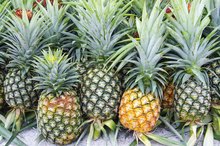What does fact checked mean?
At Healthfully, we strive to deliver objective content that is accurate and up-to-date. Our team periodically reviews articles in order to ensure content quality. The sources cited below consist of evidence from peer-reviewed journals, prominent medical organizations, academic associations, and government data.
The information contained on this site is for informational purposes only, and should not be used as a substitute for the advice of a professional health care provider. Please check with the appropriate physician regarding health questions and concerns. Although we strive to deliver accurate and up-to-date information, no guarantee to that effect is made.
Side Effects of Using Agave Syrup
Agave syrup is made from agave plants found in the American southwest, Mexico, and parts of South America. Agave syrup is low on the glycemic index, but contains more calories than sugar. It's sweeter than sugar, so you may consume less -- but it is 90 percent fructose, a simple sugar that may raise triglycerides and trigger abdominal pain, reports Joy Bauer from the Today show.
Increased Risk of Heart Disease
Agave syrup is mostly fructose -- a type of sugar easily metabolized into a form of fat known as triglycerides. Triglycerides raise cholesterol levels, blood pressure and increase your risk of heart disease, according to the American Heart Association 2.
Irritable Bowel Syndrome
Does Agave Nectar Produce Acne or Rosacea?
Learn More
Agave syrup may cause gas, bloating and abdominal pain, reports Joy Bauer of the Today Show. Ms. Bauer recommends using stevia, erythritol, Splenda, Equal or sugar instead of agave syrup if you suffer from IBS.
Allergies
People allergic to any member of the Agavaceae plant family should avoid using agave syrup. Skin rashes have been reported as an allergic reaction.
Related Articles
References
- MSNBC.com: How sweet it is: The scoop on sugar substitutes
- American Heart Association: Triglycerides
- Ray Sahelian, M.D.: Agave Syrup Health Benefit
- Sweetener, syrup, agave. FoodData Central. U.S. Department of Agriculture. Published April 1, 2019.
- Schaefer EJ, Gleason JA, Dansinger ML. Dietary fructose and glucose differentially affect lipid and glucose homeostasis. J Nutr. 2009;139(6):1257S-1262S. doi:10.3945/jn.108.098186
- Stanhope KL, Schwarz JM, Havel PJ. Adverse metabolic effects of dietary fructose: Results from the recent epidemiological, clinical, and mechanistic studies. Curr Opin Lipidol. 2013;24(3):198-206. doi:10.1097/mol.0b013e3283613bca
- Gardner E. Alternative sugars: Agave nectar. Br Dent J. 2017;223(4):241. doi:10.1038/sj.bdj.2017.697
- Rippe JM, Angelopoulos TJ. Sucrose, high-fructose corn syrup, and fructose, their metabolism and potential health effects: What do we really know?. Adv Nutr. 2013;4(2):236-45. doi:10.3945/an.112.002824
- Alwahsh SM, Gebhardt R. Dietary fructose as a risk factor for non-alcoholic fatty liver disease (NAFLD). Arch Toxicol. 2017;91(4):1545-1563. doi:10.1007/s00204-016-1892-7
- Organic Certifying Agents. USDA Agricultural Marketing Service.
Writer Bio
Maura Shenker is a certified holistic nutritionist and health counselor who started her writing career in 2010. She leads group workshops, counsels individual clients and blogs about diet and lifestyle choices. She holds a Bachelor of Fine Arts from the Rhode Island School of Design, a Master of Fine Arts from The Ohio State University and is a graduate of the Institute for Integrative Nutrition.









